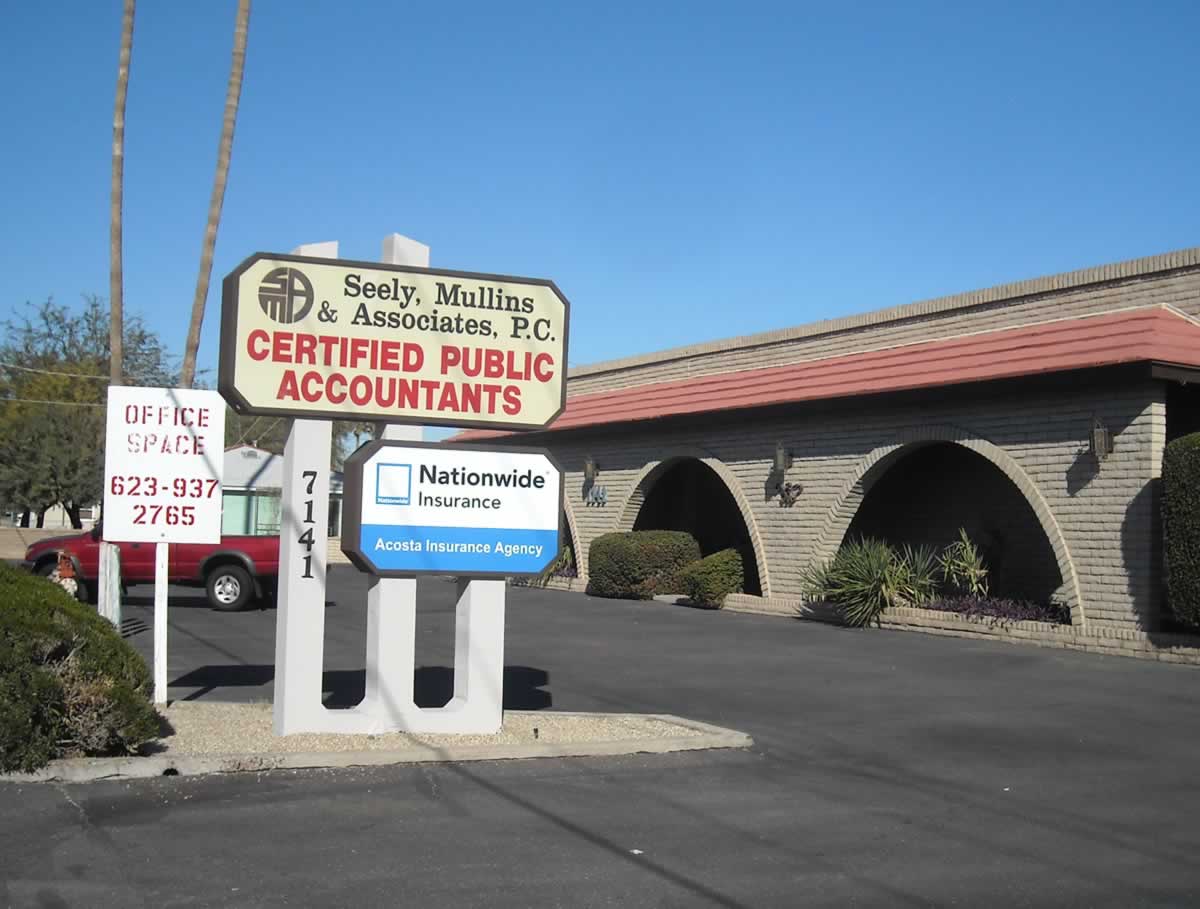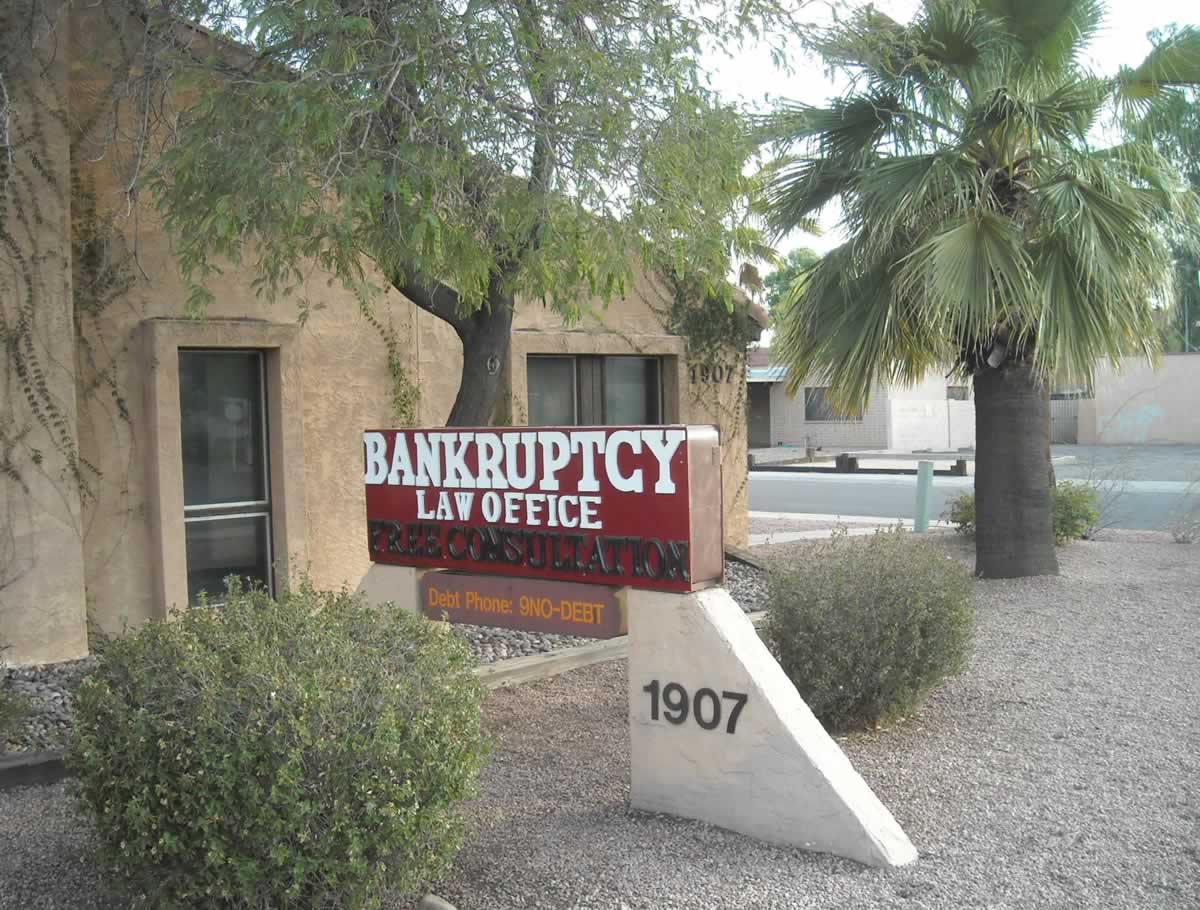|
Learn about bankruptcy and how filing can help you below with our Frequently Asked Questions. If you have any additional questions or want to know more about your specific case, call our Bankruptcy attorneys at (480)-968-3100.
A Chapter 7 Bankruptcy is a liquidation bankruptcy in which the individual debtor seeks to discharge as much of their debt as possible and obtain a fresh start. In Chapter 7 you can discharge most debts, including credit card debt, payday loan debts, medical debt, certain tax debts, and judgments resulting from lawsuits and deficiency judgments from repossessed cars or foreclosed upon homes. If you have a secured debt such as a mortgage, you have the option of either surrendering the house and having the debt discharged through the Chapter 7, or if you are current on the payments you can keep the house as long as you continue to make the payments. If you have other secured debt such as a vehicle loan or an appliance or electronics purchase, you have the option of either surrendering the vehicle or other collateral, and having the debt discharged through the Chapter 7, or if you would like to retain the collateral you can reaffirm the debt or enter into a redemption agreement. A reaffirmation agreement is an agreement with a creditor that is entered after the filing of the Chapter 7 Bankruptcy. Pursuant to 11 U.S.C. §521 of the United States Bankruptcy Code, if you intend to retain the property that is collateral for a debt (other that a debt secured by real property), you MUST either enter into the Reaffirmation Agreement within 45 days after the date of the Meeting of Creditors or redeem such property (pay the agreed upon value of the collateral in full). Failure to timely enter into the Reaffirmation Agreement or redeem the debt will result in the bankruptcy stay being lifted and will give the creditor the right to repossess the collateral. If you enter into a Reaffirmation Agreement, you will have waived your right to have the debt discharged in the Chapter 7 Bankruptcy. This means that the debt will survive the discharge. In the event that you default on the loan in the future, the creditor can repossess the collateral, and collect any deficiency following the sale of the collateral from you. At the end of the Chapter 7 proceeding, the court enters a discharge which cancels most, but not all debts. In the majority of the cases that we file, our clients do not lose assets. This is either because they simply do not own any meaningful non-exempt assets, or because we guided them through the process of legitimate pre-bankruptcy planning. For more information see the Chapter 7 Bankruptcy Timeline.
We can help! Call now for a FREE Debt Consultation! A Chapter 13 is a reorganization bankruptcy in which you put together a plan that specifies how the debts are going to be paid back. You make a payment each month to a court appointed trustee. The trustee acts as a disbursing agent and pays your creditors for you. At the end of the plan, the court enters a discharge canceling the remainder of your debt with a few exceptions. Chapter 13 has many advantages, including:
For more information see the Chapter 13 Bankruptcy Timeline.
We can help! Call now for a FREE Debt Consultation! The Fair Credit Reporting Act specifies that a bankruptcy filing will be part of your credit report for ten (10) years. See 15 U.S.C. §1681c(a)(1). For a complete text of the law governing credit reporting see www.ftc.gov/os/statutes/031224fcra.pdf We can help! Call now for a FREE Debt Consultation!
480-968-3100 or toll free at 1-800-790-8616 Exempt property means property that the bankruptcy trustee is not allowed to take possession of and liquidate for the benefit of your creditors. Historically, the purpose of allowing individuals to exempt property has always been to allow debtors to retain those items of property deemed essential to daily life. In the bankruptcy context, allowing an individual to exempt certain assets serves the purpose of allowing the individual to obtain a fresh start. To determine what property will be exempt in your case will depend on what exemption statutes you are required to use. If you have lived in Arizona for the 730 days (2 years) before the bankruptcy is filed the Arizona exemption statutes must be used. If you have not lived in Arizona for 730 days before the filing of the case, the exemption statutes for the state that you lived in during the 180 days preceding the 730 day period must be used. If you lived in more than one state during the 180 day period, the exemption statutes for the state that you lived in the most during the 180 day period must be used. To make things even more complicated, if the previous state that you lived in requires that you be a resident of that state to claim the exemptions, you must then use the Federal exemptions. If you are unsure what exemptions will be applied in your case, consult with your attorney. If the Arizona exemptions must be used in your case, some of the more common exemptions include:
Household furniture and furnishings, household goods, including consumer electronic devices, and household appliances personally used by the debtor or a dependent of the debtor and not otherwise specifically prescribed in this chapter are exempt from process provided their aggregate fair market value does not exceed six thousand dollars. [A.R.S. §33-1123]
1. All wearing apparel not in excess of a fair market value of five hundred dollars. 2. All musical instruments provided for the debtor's individual or family use not in excess of an aggregate fair market value of four hundred dollars. 3. Domestic pets, horses, milk cows and poultry not in excess of an aggregate fair market value of eight hundred dollars. 4. All engagement and wedding rings not in excess of an aggregate fair market value of two thousand dollars. 5. The library of a debtor, including books, manuals, published materials and personal documents not in excess of an aggregate fair market value of two hundred fifty dollars. 6. One watch not in excess of a fair market value of one hundred fifty dollars. 7. One typewriter, one bicycle, one sewing machine, a family bible, a lot in any burial ground, one shotgun or one rifle or one pistol, not in excess of an aggregate fair market value of one thousand dollars. 8. Equity in one motor vehicle not in excess of six thousand dollars. If the debtor or debtor's dependent is physically disabled, the equity in the motor vehicle shall not exceed twelve thousand dollars. 9. Professionally prescribed prostheses for the debtor or a dependent of the debtor, including a wheelchair is 100% Exempt [A.R.S. §33-1125]
1. All money received by or payable to a surviving spouse or child on the life of a deceased spouse, parent or legal guardian, not exceeding twenty thousand dollars. 2. The earnings of the minor child of a debtor or the proceeds of these earnings by reason of any liability of the debtor not contracted for the special benefit of the minor child. 3. All monies received by or payable to a person entitled to receive child support or spousal maintenance pursuant to a court order. 4. All money, proceeds or benefits of any kind to be paid in a lump sum or to be rendered on a periodic or installment basis to the insured or any beneficiary under any policy of health, accident or disability insurance or any similar plan or program of benefits in use by any employer, except for premiums payable on such policy or debt of the insured secured by a pledge, and except for collection of any debt or obligation for which the insured or beneficiary has been paid under the plan or policy and except for payment of amounts ordered for support of a person from proceeds and benefits furnished in lieu of earnings that would have been subject to that order and subject to any exemption applicable to earnings so replaced. 5. All money arising from any claim for the destruction of, or damage to, exempt property and all proceeds or benefits of any kind arising from fire or other insurance on any property exempt under this article. 6. The cash surrender value of life insurance policies where for a continuous unexpired period of two years the policies have been owned by a debtor and have named as beneficiary the debtor's surviving spouse, child, parent, brother or sister, or any other dependent family member, in the proportion that the policy names any such beneficiary, except that, subject to the statute of limitations, the amount of any premium that is recoverable or avoidable by a creditor pursuant to title 44, chapter 8, article 1, with interest thereon, is not exempt. The exemption provided by this paragraph does not apply to a claim for the payment of a debt of the insured or beneficiary that is secured by a pledge or assignment of the cash value of the insurance policy or the proceeds of the policy. For the purposes of this paragraph, "dependent" means a family member who is dependent on the insured debtor for not less than half support. 7. An annuity contract where for a continuous unexpired period of two years that contract has been owned by a debtor and has named as beneficiary the debtor, the debtor's surviving spouse, child, parent, brother or sister, or any other dependent family member, except that, subject to the statute of limitations, the amount of any premium, payment or deposit with respect to that contract is recoverable or avoidable by a creditor pursuant to title 44, chapter 8, article 1 is not exempt. The exemption provided by this paragraph does not apply to a claim for a payment of a debt of the annuitant or beneficiary that is secured by a pledge or assignment of the contract or its proceeds. For the purposes of this paragraph, "dependent" means a family member who is dependent on the debtor for not less than half support. 8. Any claim for damages recoverable by any person by reason of any levy on or sale under execution of that person's exempt personal property or by reason of the wrongful taking or detention of that property by any person, and the judgment recovered for damages. 9. A total of three hundred dollars held in a single account in any one financial institution as defined by section 6-101. The property declared exempt by this paragraph is not exempt from normal service charges assessed against the account by the financial institution at which the account is carried. 10. An interest in a college savings plan under section 529 of the internal revenue code of 1986, either as the owner or as the beneficiary. This does not include money contributed to the plan within two years before a debtor files for bankruptcy. B. Any money or other assets payable to a participant in or beneficiary of, or any interest of any participant or beneficiary in, a retirement plan under section 401(a), 403(a), 403(b), 408, 408A or 409 or a deferred compensation plan under section 457 of the United States internal revenue code of 1986, as amended, whether the beneficiary's interest arises by inheritance, designation, appointment or otherwise, is exempt from all claims of creditors of the beneficiary or participant. This subsection does not apply to any of the following: 1. An alternate payee under a qualified domestic relations order, as defined in section 414(p) of the United States internal revenue code of 1986, as amended. The interest of any and all alternate payees is exempt from any and all claims of any creditor of the alternate payee. 2. Amounts contributed within one hundred twenty days before a debtor files for bankruptcy. 3. The assets of bankruptcy proceedings filed before July 1, 1987. C. Any person eighteen years of age or over, married or single, who resides within this state and who does not exercise the homestead exemption under article 1 of this chapter may claim as a personal property homestead exempt from all process prepaid rent, including security deposits as provided in section 33-1321, subsection A, for the claimant's residence, not exceeding two thousand dollars. D. This section does not exempt property from orders that are the result of a judgment for arrearages of child support or for a child support debt. [A.R.S. 33-1126]
The following tools and equipment of a debtor used in a commercial activity trade, business or profession shall be exempt from process: 2. Farm machinery, utensils, implements of husbandry, feed, seed, grain and animals not in excess of an aggregate value of two thousand five hundred dollars belonging to a debtor whose primary income is derived from farming. 3. All arms, uniforms and accoutrements required by law to be kept by a debtor. [A.R.S. 33-1130]
B. Except as provided in subsection C, the maximum part of the disposable earnings of a debtor for any workweek which is subject to process may not exceed twenty-five per cent of disposable earnings for that week or the amount by which disposable earnings for that week exceed thirty times the minimum hourly wage prescribed by federal law in effect at the time the earnings are payable, whichever is less. C. The exemptions provided in subsection B do not apply in the case of any order for the support of any person. In such case, one-half of the disposable earnings of a debtor for any pay period is exempt from process. D. The exemptions provided in this section do not apply in the case of any order of any court of bankruptcy under chapter XIII of the federal bankruptcy act or any debt due for any state or federal tax. [A.R.S. 33-1131] We can help! Call now for a FREE Debt Consultation!
480-968-3100 or toll free at 1-800-790-8616 The filing of a Chapter 7 or 13 will have no effect on criminal matters. These include such matters as: Issuing a bad check (ARS 13-1807); the concealment, disposal, removal, or sale of mortgaged personal property (ARS 44-1219); failing to return rented property (ARS 13-1806). The most common debts that are not discharged include:
Any tax for which a return was required, but not filed will not be discharged. Any tax for which a fraudulent return was filed will not be discharged. Any tax that debtor willfully attempted to evade will not be discharged. Any tax with respect to which a late return was filed within two years of the filing of the bankruptcy will not be discharged. Taxes on income or gross receipts for which a return was due within three years of the filing of the bankruptcy will not be discharged. Taxes on income or gross receipts assessed within 240 days before filing the bankruptcy will not be discharged. Taxes on income or gross receipts not yet assessed, but assessable after the filing of the bankruptcy will not be discharged. Property taxes assessed before commencement of the case and last payable without penalty less than one year before filing of the bankruptcy. Excise taxes on transactions as to which a return was required and last due less than three years before the bankruptcy. Excise taxes on transactions as to which no return was required, which occurred less than three years before the bankruptcy. Taxes required to be collected or withheld by the debtor, such as employment trust fund taxes (income taxes and FICA withholding) or sales taxes.
We understand that determining whether tax debts can be discharged is very confusing. One of our experienced attorney’s will be more than happy to review your tax liability situation with you and help you determine which, if any, of your tax debts can be discharged.
No. The discharge of a debt in bankruptcy, unlike most other types of discharge of indebtedness without payment, is excludable from gross income for tax purposes. See Internal Revenue Code, 26 U.S.C. §108(a)(1)(A). The current version of Form 1099C states that “Debts canceled in bankruptcy are not includable in your income.” http://www.gpo.gov/fdsys/pkg/USCODE-2010-title26/html/USCODE-2010-title26-subtitleA-chap1-subchapB-partIII-sec108.htm We can help! Call now for a FREE Debt Consultation!
480-968-3100 or toll free at 1-800-790-8616 In most cases, you can get your vehicle back if you file a Chapter 13 bankruptcy petition BEFORE the vehicle has been sold by the creditor. It has been our experience that once the petition is filed, most creditors voluntarily return the vehicle to you. If the creditor does not voluntarily return the vehicle, we file a Complaint for Turnover in the bankruptcy court. In most cases, the vehicle will be returned to you and you will no longer be required to make the vehicle payments directly to the lender. The payments will be made to the lender by your Chapter 13 Trustee out of the plan payments that you make to the Trustee. We can help! Call now for a FREE Debt Consultation!
480-968-3100 or toll free at 1-800-790-8616 Yes, as long as the bankruptcy petition is filed before the foreclosure/ Trustee Sale takes place. As soon as the bankruptcy petition is filed with the court, a stay immediately goes into effect. The stay prohibits creditor action against you, including prohibiting a foreclosure or trustee sale from taking place. If you want to keep the property, you MUST file the Chapter 13 bankruptcy BEFORE the foreclosure or trustee sale takes place. If you file a Chapter 13, you will not be required to come up with all of the missed payments and fees to keep the house. The mortgage payment arrears, late charges and fees will be paid back through your Chapter 13 plan over a period of 3-5 years. All you will be required to do is make all mortgage payments that come due after your case is filed along with the Chapter 13 plan payment. We can help! Call now for a FREE Debt Consultation!
480-968-3100 or toll free at 1-800-790-8616 You own the house until the foreclosure/Trustee Sale takes place. Since you own the house, you can stay in the house until the sale takes place. Once the sale takes place, you will no longer have an ownership interest in the property and must move out. If you do not move out of the property when the sale takes place, you will receive a demand to vacate. You must immediately vacate. If you do not do so, the next visit you will receive will likely be from the Sheriff. The Sheriff will likely arrive with a professional mover who will remove the property from your former house and place the property in storage. You will not see the property again unless you pay for the cost of the move. In addition, you may also be assessed with the reasonable rental expense to cover the period in which you occupied the house following the Trustee Sale. We can help! Call now for a FREE Debt Consultation!
480-968-3100 or toll free at 1-800-790-8616 The easy answer is that you must reside in Arizona for at least 91 out of the previous 180 days. The more complete answer is found in 28 U.S.C. §1408 which provides that a debtor may file bankruptcy in any judicial district in which the debtors domicile, residence, principal place of business, or principal assets have been located for 180 days prior to the petition or for a longer portion of that 180 days than in any other district. http://www.gpo.gov/fdsys/pkg/USCODE-2007-title28/html/USCODE-2007-title28-partIV.htm We can help! Call now for a FREE Debt Consultation!
480-968-3100 or toll free at 1-800-790-8616 Generally, you must not have been removed from the state for more than 90 days to file in Arizona. However, pursuant to 28 U.S.C. §1408 even if you have been out of the state for over 90 days, you still may be able to file here if your principal assets are still located in Arizona. We can help! Call now for a FREE Debt Consultation!
480-968-3100 or toll free at 1-800-790-8616 Unless you are famous, do not expect to see your bankruptcy published in any newspaper. Bankruptcy is a matter of public record however. Anyone that wants to can review the bankruptcy filings through the bankruptcy court website. But who really wants to? We can help! Call now for a FREE Debt Consultation!
480-968-3100 or toll free at 1-800-790-8616 Relocating out of state is not a problem. As soon as you change your address you will be required to provide the court, trustee and your attorney with your new address. If you fail to change your address, the court, trustee and attorney may be unable to locate you to provide you with important deadlines, requests, etc. We can help! Call now for a FREE Debt Consultation!
480-968-3100 or toll free at 1-800-790-8616 Filing a bankruptcy requires a great deal of information. The Bankruptcy schedules and statements that must be filed, and the Trustee that will be appointed by the court in your case will require that you provide a great deal of information to us before your case can be filed, and to the trustee during the course of your case. Some of the most common items include:
The online course is available at www.cricketdebt.com in English, Spanish, Chinese, Korean, Vietnamese, Russian, Tagalong and Romanian. The phone course is available in English and Spanish at 866-719-0400. The McDonald Law Offices Attorney code for Cricket is 830772
We can help! Call now for a FREE Debt Consultation!
480-968-3100 or toll free at 1-800-790-8616 Pre-Bankruptcy: To be eligible to file bankruptcy, 11 U.S.C. §109(h) requires that a debtor receive, within the 180 day period before the bankruptcy is filed, a briefing from an approved nonprofit budget and credit counseling agency. We recommend that you obtain the certificate through cricketdebt.com. Cricket offers the course either online or over the phone. The online course is available at www.cricketdebt.com in English, Spanish, Chinese, Korean, Vietnamese, Russian, Tagalong and Romanian. Click Start Counseling Now. Follow the directions for the First Course. The phone course is available in English and Spanish at 866-719-0400. The course through Cricket usually takes 45-60 minutes. Cricket charges $15.00 if you give them our attorney Code of 830772. After you have completed the course and paid the fee, Cricket will email or send a certificate of completion to you.
Post-Filing: To receive a discharge in either a Chapter 7 or Chapter 13 case, you must complete an instructional course concerning financial management. The certificate must be filed no later than forty-five (45) days after the date of the meeting of creditors in a Chapter 7, and no later than the date that you make the last plan payment in a Chapter 13 case. The course can not be taken until after the bankruptcy has been filed. To verify that you have filed, the counseling agency will require that you give them your bankruptcy court case number. We recommend that you obtain the certificate through Cricket Debt Counseling. Cricket offers the course either online at cricketdebt.com or over the phone at 866-719-0400. As of this date, the cost for the course through Cricket is $9.00 if you give them our attorney Code of 830772. We can help! Call now for a FREE Debt Consultation!
480-968-3100 or toll free at 1-800-790-8616 Some banks and all credit unions close bank accounts if a debt is owed to the financial institution at the time that the bankruptcy is filed. If you owe a debt to a bank or credit union that you have an open bank account with, it is possible that they will close the bank account(s) once your case is filed. Consequently, you should reduce the amount in the account to $0.00 prior to the filing of your case. If you open a bank account at a financial institution that you do not owe money to prior to the filing of your case, you must provide us with the account information prior to the filing of your case so that the account can be properly listed in your schedules. We can help! Call now for a FREE Debt Consultation!
480-968-3100 or toll free at 1-800-790-8616 Yes. Unless the judgment is based on a debt that would not be discharged (ie., child support, spousal maintenance, personal injury caused by intoxication, fraud, student loans, etc.) the discharge which you get in bankruptcy will extinguish your personal liability for the debt. Unfortunately, the discharge of a judgment does not remove the judgment from property to which it might have attached before the filing of the bankruptcy. The judgment cannot be used to collect against you personally, but it may still be used against property which you owned before the discharge. When a judgment is recorded, it becomes a lien, similar to a mortgage, on property that you own. Even though your personal liability on the judgment will be discharged, the lien will remain on the property. You will not be able to sell the property until the lien is paid or removed, and in some cases the creditor may sell the property to pay the lien. If the property is exempt the lien can be removed. This is not part of the ordinary bankruptcy procedure. While your bankruptcy is open, you must request your attorney to file a Complaint to Avoid a Judgment Lien. There is an extra charge for this action. We can help! Call now for a FREE Debt Consultation!
480-968-3100 or toll free at 1-800-790-8616 No, with one exception. Education loans are not generally discharged in Chapter 7 or Chapter 13. Educational loans may be discharged only if the court finds that the loan "will impose an undue hardship on the debtor and the debtor's dependents." You must be able to demonstrate that you cannot make payments on the loan at the time the case is filed or in the future. You must apply for the hardship discharge while your case is still open (before the discharge is granted). In Chapter 7 this is usually about 61-100 days from the date of the meeting of creditors. In Chapter 13 the case will be open until after the last plan payment is made (3 to 5 years). Application for a hardship discharge is not included in the Chapter 7 or Chapter 13 fees and must be requested and paid for after the case has been filed. We can help! Call now for a FREE Debt Consultation!
480-968-3100 or toll free at 1-800-790-8616 Yes. Any overpayment that is the result of an administrative error should be discharged. No exception to discharge applies solely because the debt is owed to a governmental agency. Social security overpayments not based on fraud or misrepresentation can be discharged in Chapter 7 and Chapter 13. We can help! Call now for a FREE Debt Consultation!
480-968-3100 or toll free at 1-800-790-8616 Yes. Certain tax debts can be discharged and others can not. See 11 U.S.C. §523(a)(1). The following is a summary of tax debts that will not be discharged.
We can help! Call now for a FREE Debt Consultation!
480-968-3100 or toll free at 1-800-790-8616 Maybe. A post-petition claim can only be filed by the holder of the claim and not by the debtor. See 11 U.S.C. §1305(a). The inclusion of a post-petition claim in a Chapter 13 plan can only occur if both the debtor and creditor agree to include the claim. The IRS will usually agree to file a 1305 claim to include a post-petition tax liability in the plan, but the Arizona Department of Revenue will not. The IRS, however, will not be willing to do this more than once while you are in the Chapter 13. The IRS expects you to adjust your withholding so that you will not incur future post-petition tax liability. We can help! Call now for a FREE Debt Consultation!
480-968-3100 or toll free at 1-800-790-8616 The cosigner's liability for the debt is not affected by your discharge. Cosigners are almost always joint and severally liable. This means the creditor can collect the entire debt from any person who has signed for the debt. If one of the signers receives a discharge, the creditor will still be able to collect the entire debt (plus interest, attorneys fees and collection charges, if the contract provides) from the other signers. We can help! Call now for a FREE Debt Consultation!
480-968-3100 or toll free at 1-800-790-8616 If you file Chapter 13, a co-debtor stay automatically goes into effect prohibiting creditors from collecting consumer debt from co-debtors. However, in order to maintain this protection, your Chapter 13 plan must provide for payment of the entire debt and interest. We can help! Call now for a FREE Debt Consultation!
480-968-3100 or toll free at 1-800-790-8616 No. After you return the completed Bankruptcy Questionnaire to us, we will obtain all three of your credit reports from CIN Legal Data Services. We use CIN Legal Data Services because they have obtained the correct bankruptcy department address for most creditors and we can import all three credit reports from CIN directly into the schedules that will be filed with the court. https://www.cingroup.com/companies/cinlegal/ We can help! Call now for a FREE Debt Consultation!
480-968-3100 or toll free at 1-800-790-8616 Yes! Yes! Yes! You may not get a discharge for any debt which you do not list. In addition, you will sign a declaration under penalty of perjury that your schedules listing your creditors are "true and correct". Intentionally omitting a creditor could be a violation of this oath. We can help! Call now for a FREE Debt Consultation!
480-968-3100 or toll free at 1-800-790-8616 If you have an account with no balance (such as a Visa or MasterCard which has been paid off), you do not owe that company any money and it does not have to be listed. The creditor may still allow you to use the account after the bankruptcy. However some creditors (American Express, for example) may check bankruptcy filings and may cancel the card even if no debt was owed and they were not listed in the bankruptcy. We can help! Call now for a FREE Debt Consultation!
480-968-3100 or toll free at 1-800-790-8616 You should not do so without first talking to your attorney. If you pay any creditor a total of $600 or more within 90 days before your case is filed, you must list those payments in the Statement of Financial Affairs. These payments may be considered as a preference. If the creditor was a relative, friend or business associate, payments which total $600 or more within the 12 month period before your case is filed must also be listed in the Statement of Financial Affairs. These payments may be considered as a preference. The Chapter 7 trustee may make the creditor turn over those payments to him or her to be divided between all of the creditors. If you file Chapter 13, the amount of your plan payments may be affected by preference payments. We can help! Call now for a FREE Debt Consultation!
480-968-3100 or toll free at 1-800-790-8616 Yes, if the debt was incurred before the filing of your case and you add the creditor soon enough. In Chapter 7 you must file an amendment adding the creditor prior to the closing of the case. If the Chapter 7 trustee will be distributing assets, you should file the amendment prior to the trustee noticing the creditors to file claims. In Chapter 13, you must file the amendment adding the creditor prior to the deadline for creditors to file a proof of claim. We can help! Call now for a FREE Debt Consultation!
480-968-3100 or toll free at 1-800-790-8616 It is too late to add the creditor. However, if the Chapter 7 trustee did not distribute any assets to your creditors, ie., it was a no asset case, many courts including In re Beezley, 994 F.2d 1433 (9th Cir.1993) have held that the debt is nevertheless discharged. In such cases, you should forward a copy of the bankruptcy notice that you received from the court shortly after your case was filed to the creditor that had not been listed. However, if a creditor could have filed a valid dischargeability complaint under one of the sections listed in 11 U.S.C. §523(c), the debt is nondischargeable after the deadline for such complaint passes. We can help! Call now for a FREE Debt Consultation!
480-968-3100 or toll free at 1-800-790-8616 Yes. One of the most common objections to discharge is that the debtor has intentionally concealed assets in order to prevent creditors from obtaining access to them. When you attend the meeting of creditors, you will be required to testify under oath that you listed all of your assets. The filing of your case creates a bankruptcy estate. Such estate is comprised of all the following property, wherever located and by whomever held: Except as provided in subsections (b) and (c)(2) of 11 U.S.C. §541, all legal or equitable interests of the debtor in property as of the commencement of the case. (2) All interests of the debtor and the debtor’s spouse in community property as of the commencement of the case that is— (A) under the sole, equal, or joint management and control of the debtor; or (B) liable for an allowable claim against the debtor, or for both an allowable claim against the debtor and an allowable claim against the debtor’s spouse, to the extent that such interest is so liable. Any interest in property that the trustee recovers under section 329 (b), 363 (n), 543, 550, 553, or 723 of this title. (4) Any interest in property preserved for the benefit of or ordered transferred to the estate under section 510 (c) or 551 of this title. (5) Any interest in property that would have been property of the estate if such interest had been an interest of the debtor on the date of the filing of the petition, and that the debtor acquires or becomes entitled to acquire within 180 days after such date— (A) by bequest, devise, or inheritance; (B) as a result of a property settlement agreement with the debtor’s spouse, or of an interlocutory or final divorce decree; or (C) as a beneficiary of a life insurance policy or of a death benefit plan. Proceeds, product, offspring, rents, or profits of or from property of the estate, except such as are earnings from services performed by an individual debtor after the commencement of the case. (7) Any interest in property that the estate acquires after the commencement of the case. We can help! Call now for a FREE Debt Consultation!
480-968-3100 or toll free at 1-800-790-8616 Possibly. In many cases there is no "court" hearing, but you must attend a "creditor's meeting" usually at the trustee's office in both Chapter 7 and Chapter 13. You (both husband and wife in joint cases) must attend the meeting or the case will be dismissed. The meeting typically takes place 30-45 days after your case is filed. The court must give you twenty days notice of the meeting. Our office will know the date, time and place as soon as your case if filed and we will notify you right away. Locations for meeting of creditors If you will be reaffirming a debt, you will be required to attend a Reaffirmation Agreement Hearing. We can help! Call now for a FREE Debt Consultation!
480-968-3100 or toll free at 1-800-790-8616 No. The court sets the meeting day and time and will not change it. The trustee may continue the meeting to a later time if a written request is made giving the circumstances. There is an additional charge for the request, and you will have to contact your attorney. We can help! Call now for a FREE Debt Consultation!
480-968-3100 or toll free at 1-800-790-8616 No, except in very unusual circumstances. We have been able to get appearances waived in cases of serious, extended illness or hospitalization. We can help! Call now for a FREE Debt Consultation!
480-968-3100 or toll free at 1-800-790-8616 Pursuant to federal law, you will need to bring both a (1) Photo ID (drivers license, state issued photo ID, a passport or legal alien card), and (2) your social security card (The actual card, and not a copy). If you do not bring both forms of ID to the meeting of creditors, the Trustee will not conduct the meeting and will make you return at a later date. If you do not have your social security card, you must go to the nearest Social Security Administration office and obtain a replacement card. Visit this site to find the nearest Social Security Administration Office. https://secure.ssa.gov/apps6z/FOLO/fo001.jsp The court typically schedules 6-8 people per half hour for these meetings. You should arrive at least 20 minutes early for the meeting to give the attorney time to meet with you and any other clients scheduled at the same time. At your scheduled time, the Trustee will invite the group into the meeting room. The Trustee will give a brief speech regarding the procedure, and will then commence calling names as scheduled on the calendar posted outside of the meeting room. When it is your turn, you will approach the trustee and hand him/her your two forms of ID. The Trustee will swear you in, review the ID’s, and then commence asking you a series of questions. The questions vary depending on the Trustee, but generally consist of the following:
After the trustee has asked you these or similar questions, the trustee may ask you about something listed in your schedules, statements or the documents you forwarded directly to him/her. At the conclusion of the meeting, the trustee will ask if there are any creditors present. If a creditor is present, they are allowed to ask you questions about the debt owed to them or about the documents that you have filed with the court. We can help! Call now for a FREE Debt Consultation!
480-968-3100 or toll free at 1-800-790-8616 The Internal Revenue Service and the Arizona Department of Revenue will keep refunds for taxes withheld from income prior to filing (usually the first return filed after the bankruptcy is filed) to pay taxes you owe, even if the tax will be discharged. The bankruptcy trustee can take any refund which you are owed on the day that your case is filed. There are two situations where the trustee may take your refund:
We can help! Call now for a FREE Debt Consultation!
480-968-3100 or toll free at 1-800-790-8616 In the vast majority of Chapter 13 cases we file, nothing is taken by the Trustee to be distributed to creditors. You can ordinarily keep property you own such as cars, boats, and jet skis, but the value of these items will affect the amount which has to be paid to your unsecured creditors through the plan. If the houses, car, boat and jet ski are financed, the result will be different. While the trustee will not take this property, you would lose the property if you are not able to pay the financing on the property. Whether your plan can pay the loan secured by the property depends upon the kind of property it is.
A debtor is required to list all property or assets in which he or she has an interest at the time that the bankruptcy is filed. An automobile accident claim which is the basis for a pending lawsuit is an asset and must be listed. The proceeds from that lawsuit will be taken by the Trustee for the benefit of the creditors unless they are exempt. Exemptions which might apply could include recovery for damage to the vehicle. If the court should determine that the failure to disclose such an asset is material and willful, the debtor could be denied a discharge in bankruptcy. The denial of the discharge does not change the ability of the credit to take and liquidate assets which the debtor failed to disclose. In addition, by omitting this information from the schedules, the debtor could be committing perjury and bankruptcy fraud. It has been my experience that it is quite common for the insurance company that may pay the claim to advise the Trustee of the settlement. We can help! Call now for a FREE Debt Consultation!
480-968-3100 or toll free at 1-800-790-8616 You are ordinarily able to keep all property, exempt or not, in Chapter 13. In Chapter 7, the trustee attempts to get as much money as he (or she) can from your non-exempt property. He does this, not to be mean, but because it is his job -- he has been appointed by the court to get as much money for your creditors as he can. He gets paid a percentage of the money he is able to get for your creditors, so you can expect that he will take his job seriously. Whether he will take property from you to sell it is governed by his judgment of whether sufficient money will be realized from the property to cover his expenses and pay for his time. We have found in our cases that sometimes the trustees do not take any property unless they can expect to realize around $1,000 or more from all of the property taken from a single estate. Some kinds of property is very inexpensive for the trustee to collect. All he has to do to collect cash, bank accounts, and tax refunds is to require you to turn it over to him. Other property can easily be liquidated because there is a ready market for it -- your car, for example. Some things may be either expensive or difficult to handle -- pets and livestock, for example, eat while they are waiting to be sold -- and he may be more reluctant to take that kind of property. 11 U.S.C. §363 is the code section that authorizes the trustee to use, sell, or lease your property "after notice and a hearing." This means that if he will be selling your property, he will have to send a notice of a sale date. The notice varies from trustee to trustee, but will be much like an announcement of a public auction of the item at a particular date and place. Ordinarily, the person who has filed bankruptcy will also be notified so that they can also bid on it. In most cases, the trustee will require that the payment be in cash at the time of the sale, but we have had some trustees accept payments over a few months. We can help! Call now for a FREE Debt Consultation!
480-968-3100 or toll free at 1-800-790-8616 The only way to tell for sure is to look at the documents you signed when you incurred the debt. However, the kind of debt often suggests whether it is secured:
We can help! Call now for a FREE Debt Consultation!
480-968-3100 or toll free at 1-800-790-8616 If your income has been reduced: You should schedule an appointment with your attorney right away. Depending on your case, you may be able to file either an Amended Chapter 13 Plan or a Motion to Modify Chapter 13 plan to reduce the plan payments. If your plan duration is less than 60 months, you may be able to extend the duration to the 60 month maximum and reduce the payments accordingly. If your plan is already at 60 months and just meeting the reconciliation requirement meaning that you will not be able to reduce the amount that is being paid to the unsecured creditors, you will only be able to reduce the plan payments if you surrender collateral such as a vehicle that is being paid for through the plan. We can help! Call now for a FREE Debt Consultation!
480-968-3100 or toll free at 1-800-790-8616 If you do not make your plan payments, the trustee will eventually file a motion with the court to dismiss your case. If your case is dismissed, creditors will be allowed to resume all of their collection actions which may include foreclosure, repossession, garnishment, etc. How soon the trustee will ask for dismissal depends on the trustee and the stage of your case. (Trustee's policies vary; those described below are those which we see most often.)
We can help! Call now for a FREE Debt Consultation!
480-968-3100 or toll free at 1-800-790-8616 If you can make up all the missed payments, get them to the trustee before the deadline in the motion. The trustee will ordinarily withdraw his motion. If you cannot make up the payments, you should schedule an appointment with your attorney to see about modifying your plan. Possible modifications include:
We can help! Call now for a FREE Debt Consultation!
480-968-3100 or toll free at 1-800-790-8616 Options available to you include:
We can help! Call now for a FREE Debt Consultation!
480-968-3100 or toll free at 1-800-790-8616 You must immediately schedule an appointment with your attorney. It is the bankruptcy stay that allows you to keep the property. Once the stay has been lifted, the creditor can proceed with the foreclosure process or the repossession of the collateral. If the motion is regarding a house and a Trustee’s Sale was previously scheduled, the sale will be conducted on the next scheduled date following the lifting of the stay without any further notice to you. If the stay is lifted, you will not be able to keep this property unless you cure the entire default including any amounts that were to be cured through the Chapter 13 Plan, all of the creditor’s attorney’s fees and costs and any collection and foreclosure costs. If the motion was filed regarding a house, the default would have to be cured with certified funds before the Trustee Sale takes place. It may be possible to prevent the stay from being lifted by filing a response to the creditor’s motion. You only have fifteen (15) days from the date of the motion to file a response. Therefore, if you want to file a response, you MUST schedule an appointment with your attorney IMMEDIATELY. If a response is not filed, the stay will be lifted even if you cure the default. If you have not missed any payments to this creditor, you will be required to provide proof of all of the payments that have been made since the date that the bankruptcy was filed. If you have missed payments, we may be able to propose a stipulation with the creditor to allow you to cure the post-petition default. We can help! Call now for a FREE Debt Consultation!
480-968-3100 or toll free at 1-800-790-8616 A reaffirmation agreement is an agreement with a creditor that is entered after the filing of the Chapter 7 Bankruptcy. Pursuant to 11 U.S.C. §521 of the United States Bankruptcy Code, if you intend to retain the property that is collateral for a debt (other that a debt secured by real property), you MUST either enter into the Reaffirmation Agreement within 45 days after the date of the Meeting of Creditors or redeem such property (pay the agreed upon value of the collateral in full). Failure to timely enter into the Reaffirmation Agreement or redeem the debt will result in the bankruptcy stay being lifted and will give the creditor the right to repossess the collateral. If you enter into a Reaffirmation Agreement, you will have waived your right to have the debt discharged in the Chapter 7 Bankruptcy. This means that the debt will survive the discharge. In the event that you default on the loan in the future, the creditor can repossess the collateral, and collect any deficiency following the sale of the collateral from you. We can help! Call now for a FREE Debt Consultation!
480-968-3100 or toll free at 1-800-790-8616 Generally, a redemption agreement is an agreement in which you agree to pay the lien holder the value of the collateral in one lump sum cash payment. Upon payment of the agreed upon amount, the security interest is eliminated. Redemption can only be used in cases of dischargeable consumer debts secured by tangible personal property which has been either exempted by the debtor or abandoned by the trustee. Visit these sites to look into financing for the redemption agreement:
We can help! Call now for a FREE Debt Consultation!
480-968-3100 or toll free at 1-800-790-8616 Adequate protection payments are payments made by the Chapter 13 Trustee (out of the plan payments that you have made to the trustee) to a creditor holding an allowed claim secured by personal property such as an automobile. The purpose of the payments is to protect the lien holder against the depreciation of the property. In this district, the court has determined that generally, 1% of the value of the vehicle is sufficient adequate protection. If, for example, you are paying for a vehicle through your Chapter 13 Plan and the vehicle is valued at $10,000.00, the trustee will pay the lien holder $100.00 per month out of the payments that you make to the trustee each month. These adequate protection payments continue until the trustee commences making the regular payments on the claim. We can help! Call now for a FREE Debt Consultation!
480-968-3100 or toll free at 1-800-790-8616 Yes. If the value of your house is less than what you owe on the first mortgage/deed of trust, you can file an adversary complaint against the holder of the second mortgage/deed of trust in the Chapter 13 and seek an order voiding the lien. We can help! Call now for a FREE Debt Consultation!
480-968-3100 or toll free at 1-800-790-8616 |
More Information About Filing a Bankruptcy in Arizona Chapter 7 Bankruptcy Overview Chapter 13 Bankruptcy Overview What can be Stopped? Frequently Asked Questions |
||||
We have the experienced bankruptcy lawyers you need to obtain the fresh start you deserve. CALL TODAY FOR A FREE CONSULTATION 480-968-3100 623-937-8308 Toll Free: 1-800-790-8616 By Email: mail@mcdonaldlawaz.com Please call McDonald Law Offices to schedule a time to talk to one of our experienced Arizona bankruptcy attorneys. If you call during our business hours it is likely that one of our bankruptcy lawyers will be available to talk to you when you call. The attorney will be able to go over how you can stop foreclosure, stop garnishment, and eliminate other debts through the filing of bankruptcy. During the call our lawyers will be able to determine if you qualify, how much it will cost to declare bankruptcy, what debts your bankruptcy will cover, and how long it takes to file. CALL NOW! There is no obligation and the consultation is free.
|













